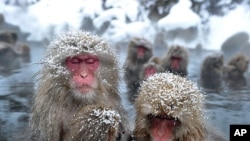A year after the 2011 earthquake, Japan is slowly recovering. However, domestic tourism has been devastated as many Japanese, wracked by survivor guilt, choose to stay home, and overseas tourists continue to avoid the country because of fears about radiation. Nagano, Japan, a major winter sports destination famous for its snow monkeys, is struggling to boost its tourism economy.
The number of tourists on the ski slopes of the Japanese Alps this winter is down drastically. In 2010, 300,000 foreign tourists visited Nagano prefecture, site of many events in the 1998 Winter Olympics.
Nishimura Hiroshi, assistant director of international tourism in Nagano, says, since last year's earthquake, tsunami and nuclear scare, there has been an 80 percent drop in tourism.
"Nationally, tourism went down," said Hiroshi. "Overseas tourists stopped coming, not because of the earthquake, but because of Fukushima Daiichi [and the] the radiation. To people from overseas, it looks like Nagano is not far from Fukushima, so it affected us more."
Tomijiro Sato is president of Villa Ichinose, a family-run hotel adjacent to Nagano's Olympic ski run. Seventy-year-old Sato opened the hotel with his father during the 1964 Tokyo Olympic Games. His village and others nearby were shaken by a 6.0 magnitude aftershock following the initial earthquake last year.
With around 20 percent of the Nagano economy dependent on tourism, at least 15 local hotels have since closed. Sato has never known such tough times, even after the 1995 Kobe earthquake in which 6,500 people died.
"We have a good hotel and staff," said Sato. "We are surviving by word of mouth. We had no guests after this earthquake and some hotels closed. But the government has offered loans, which is very helpful."
In addition to providing loans, the government has budgeted around $15 million to dispel concerns among prospective foreign tourists about the potential dangers of visiting Japan. There is a consensus that supporting tourism can help effect Japan's economic recovery.
"Having more visitors would help us, help the affected areas and help build up the nation once more," added Hiroshi.
However, with recent volatility in global economic markets, the Japanese Yen has become a safe haven. Its rising value means visiting Japan is increasingly expensive for foreign tourists converting their spending money from other currencies.
There also appears to be some uncertainty about how best to prioritize tourism in the national rebuilding context. The Japanese parliament recently withheld budgetary approval for a $14 million plan to offer 10,000 free air tickets to foreign visitors. Concerns were raised about value, and the moral example such an offer would set in the face of still pervasive destruction.
It is not just overseas visitor numbers that have plummeted. Domestic leisure and business travel in Nagano has fallen 60 percent, according to Nishimura.
"[Japanese] started to have the trend of not enjoying themselves after the earthquakes because many people were dead and hurt. They [understandably] stopped travelling and having fun," said Nishimura.
Post-traumatic stress and survivor guilt is not unusual after natural disasters, observes Dr. William Helton, a psychology professor at Canterbury University in New Zealand.
"We don't like radical change, and there's no way to get around it; this is radical change," said Helton. "It's caused us to rethink how things are going to be. There's no doubt we can experience, vicariously, people's emotional distress."
Helton studied the effects of the 2011 Christchurch earthquakes on New Zealanders. He advises that, while time can be a great healer, recovery from post-traumatic stress in areas prone to earthquakes can be problematic.
"They say 'post-traumatic stress disorder.' Well, we're still having aftershocks in Christchurch," said Helton. "It's not really 'post.' People who live outside an earthquake zone don't necessarily understand this isn't a one-off event."
Japan suffered immeasurably through the disasters of March 2011. Its people continue to mourn the thousands of victims and many economic areas struggle even as a $15 billion recovery plan takes shape.








